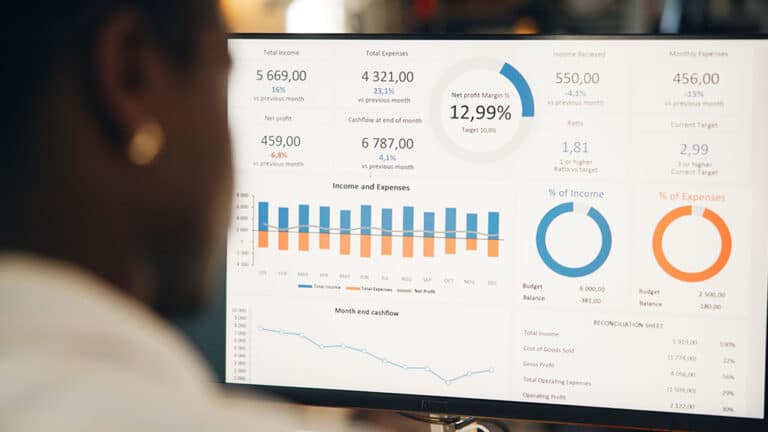Why PPC is Crucial for Small Business Growth
Small businesses face unique challenges when competing in today’s fast-paced, digital-first marketplace. Building awareness, attracting customers, and growing revenue often require strategic marketing efforts that deliver measurable results. While traditional advertising methods like print ads or direct mail can still work for some businesses, they often lack the precision and immediate impact of digital marketing tools. Among these tools, Pay-Per-Click (PPC) advertising stands out as a game-changer for small business growth.
PPC allows small businesses to directly target potential customers who are actively searching for their products or services. It offers unmatched visibility, providing small businesses with the opportunity to appear at the top of search results even in highly competitive markets. More importantly, PPC campaigns are flexible and scalable, making them suitable for businesses of any size or budget.
This guide will explore why PPC is crucial for small business growth, focusing on the immediate online visibility it provides, its cost-effective nature, and its ability to deliver high-intent traffic. By understanding these benefits, small businesses can see why investing in PPC services is a smart move for long-term success.
Immediate Online Visibility
For small businesses looking to establish a strong online presence, one of the most significant benefits of PPC advertising is immediate visibility. Unlike organic search engine optimization (SEO), which can take months to show results, PPC ads appear instantly at the top of search engine results pages (SERPs). This means that your business can immediately reach potential customers searching for the products or services you offer.
When someone types a query like “best coffee shop near me” or “affordable landscaping services,” PPC ads are often the first thing they see. These ads are prominently displayed above organic search results, giving small businesses a chance to compete with larger companies and established brands. Even if your business is new or doesn’t have a well-established website, PPC can level the playing field by providing the visibility needed to attract customers quickly.
This instant visibility is particularly valuable during time-sensitive promotions or product launches. For example, a local bakery running a special discount for Mother’s Day can use PPC ads to target users searching for “Mother’s Day cake deals.” By appearing at the top of search results, the bakery can drive traffic and increase sales precisely when demand is at its peak.
Ultimately, the ability to gain immediate online visibility makes PPC an essential tool for small businesses aiming to attract attention in a crowded market.
Cost-Effective Marketing
One of the most appealing aspects of PPC for small businesses is its cost-effectiveness. Unlike traditional advertising methods, where you pay a flat fee regardless of performance, PPC operates on a pay-per-click model. This means you only pay when someone actually clicks on your ad, ensuring that your budget is spent on users who are genuinely interested in your offerings.
PPC campaigns are highly flexible, allowing small businesses to set daily or monthly budgets based on their financial capacity. This makes it an accessible option for businesses with limited resources. For instance, a local yoga studio can start with a small budget of $10-$20 per day and still see results by targeting specific keywords like “yoga classes near me.” As the studio grows and generates more revenue, it can scale up its budget to reach a larger audience.
Additionally, PPC platforms like Google Ads allow you to adjust your campaigns in real-time. If certain ads or keywords aren’t performing well, you can pause them, reallocate your budget, or refine your targeting to improve results. This level of control ensures that every dollar spent contributes to achieving your business goals.
Small businesses also benefit from the ability to track and measure ROI with PPC. Detailed reporting tools provide insights into metrics like click-through rates (CTR), cost per click (CPC), and conversions, enabling business owners to assess the effectiveness of their campaigns. With this data, small businesses can optimize their strategies, focusing on the keywords and audiences that deliver the highest return on investment.
By offering precise budget control, real-time adjustments, and measurable results, PPC provides small businesses with a cost-effective way to reach their target audience and grow their customer base.
Precise Targeting Options
One of the most valuable features of PPC advertising is its ability to target audiences with precision, making it an especially powerful tool for small businesses. Unlike traditional forms of advertising that reach broad audiences, PPC campaigns allow you to hone in on specific demographics, locations, interests, and behaviors. This ensures your ads are shown to the people most likely to engage with your business, reducing wasted ad spend and improving overall campaign efficiency.
For small businesses that rely on local customers, geotargeting is a game-changer. Platforms like Google Ads allow you to define specific geographic areas where your ads will appear. For instance, if you own a local flower shop, you can target users within a 10-mile radius of your store. This ensures that your budget is spent attracting nearby customers who are more likely to visit your shop. Additionally, you can use location-based keywords such as “flower delivery in [city]” to capture users actively searching for your services in the area.
Demographic targeting further refines your audience by allowing you to specify parameters such as age, gender, and income level. For example, a small business selling high-end outdoor furniture might target affluent homeowners aged 30-55. This level of granularity ensures your ads reach an audience that aligns with your ideal customer profile.
Small businesses can also use behavioral targeting to connect with users based on their online activity. For example, you can target users who have searched for similar products, visited competitors’ websites, or shown interest in related topics. Combined with retargeting, which serves ads to users who have already interacted with your website, these targeting options create a powerful strategy for engaging potential customers and driving conversions.
By leveraging precise targeting options, small businesses can ensure their PPC campaigns are highly focused, maximizing the impact of every dollar spent.
Drives High-Intent Traffic
Unlike other advertising methods that focus on building brand awareness over time, PPC advertising excels at delivering high-intent traffic—users who are actively searching for your products or services. For small businesses, this means connecting with prospective customers who are already further along in their buyer journey and ready to take action.
When someone types a query like “affordable car repair near me” or “best sushi restaurant in [city],” they’re not just browsing; they’re looking for a solution to their immediate need. PPC allows your business to appear at the top of these search results, ensuring that you’re visible to users who are ready to make a purchase or book a service.
The key to attracting high-intent traffic lies in selecting the right keywords. Focus on keywords that demonstrate clear intent, such as “buy,” “get,” or “schedule.” For example, a local salon offering haircuts and styling might target keywords like “book a haircut near me” or “best hairstylist in [city].” These terms indicate that the user is prepared to make a decision and is seeking a specific service.
Ad copy also plays a crucial role in capturing high-intent users. Include compelling calls to action (CTAs) like “Call Now,” “Schedule Today,” or “Shop Now” to encourage immediate engagement. Highlighting benefits such as free consultations, discounts, or same-day services can further motivate users to take action.
By focusing on high-intent traffic, PPC helps small businesses generate leads and drive sales efficiently, delivering measurable results that contribute directly to growth.
Measurable Results and ROI
One of the most significant advantages of PPC advertising is the ability to track and measure results in real time. For small businesses, this transparency is invaluable, as it allows you to understand exactly how your marketing dollars are being spent and what impact they’re having on your bottom line.
PPC platforms like Google Ads provide detailed analytics that enable you to monitor key performance metrics such as click-through rates (CTR), cost per click (CPC), and conversion rates. These metrics offer insights into how well your campaigns are performing and whether they’re meeting your business goals. For example, if your goal is to increase online sales, you can track the number of purchases generated through your ads and calculate your return on ad spend (ROAS).
The ability to measure results also allows small businesses to make data-driven decisions. If a particular ad group or keyword isn’t performing well, you can pause it and reallocate your budget to higher-performing elements of your campaign. Similarly, A/B testing enables you to experiment with different headlines, descriptions, and landing pages to determine which combinations yield the best results.
Beyond individual campaign performance, PPC provides insights into customer behavior that can inform your broader marketing strategy. For instance, you might discover that most of your clicks come from mobile devices, prompting you to prioritize mobile optimization across your website.
By offering measurable results and actionable insights, PPC empowers small businesses to optimize their campaigns continuously and maximize their return on investment. This level of accountability ensures that every dollar spent contributes to the growth and success of your business.
Builds Brand Awareness
PPC advertising is not just about driving immediate sales or leads; it also plays a crucial role in building brand awareness for small businesses. Even if users don’t click on your ad, the visibility you gain by appearing at the top of search results helps establish your business as a credible option. When potential customers repeatedly see your ads, it reinforces your brand’s presence and increases the likelihood that they’ll think of your business when they’re ready to make a purchase.
For small businesses, brand awareness is particularly important because it helps differentiate you from competitors, especially larger, more established companies. PPC ads allow you to showcase what makes your business unique, whether that’s your competitive pricing, exceptional customer service, or specialized offerings. By crafting compelling ad copy and using visually appealing assets like images or videos, you can leave a lasting impression on users.
Remarketing campaigns are another effective way to build brand awareness. These campaigns target users who have visited your website but didn’t take action, serving them ads as they browse other sites or platforms. By staying top-of-mind, you increase the chances of converting these users into customers over time. Even if they don’t click immediately, consistent exposure to your brand builds familiarity and trust.
By focusing on PPC strategies that promote brand awareness, small businesses can ensure they remain visible and relevant to potential customers, laying the groundwork for long-term growth.
Supports Local Business Growth
For small businesses, connecting with local customers is often the key to success. PPC advertising is an incredibly effective tool for driving local business growth, thanks to its ability to target users within specific geographic areas. This ensures your ads are shown to people who are most likely to visit your physical location or use your services.
“Near me” searches, such as “best pizza near me” or “emergency plumber near me,” have become increasingly common as consumers look for convenient, local options. PPC campaigns allow you to capitalize on these high-intent searches by targeting users based on their location. With geotargeting, you can define a specific radius around your business or focus on particular neighborhoods, cities, or zip codes.
Ad extensions like location and call extensions further enhance local targeting. Location extensions display your address and a link to Google Maps, making it easy for potential customers to find your business. Call extensions allow users to click directly on your phone number to make a call, which is especially useful for service-based businesses that rely on inquiries and appointments.
Seasonal and event-based PPC campaigns are also effective for local businesses. For instance, a garden center might run ads promoting holiday-themed decorations or seasonal sales, targeting users searching for “Christmas trees near me” or “spring gardening supplies.” These localized, time-sensitive campaigns help small businesses tap into specific demand and drive foot traffic.
By focusing on local targeting, small businesses can ensure their PPC campaigns deliver highly relevant traffic, translating into more leads, sales, and in-store visits.
Scalable for Business Growth
One of the greatest advantages of PPC advertising is its scalability, making it an ideal solution for small businesses aiming to grow over time. Unlike traditional advertising, where budget increases don’t always translate into better results, PPC campaigns allow you to scale your efforts in a controlled and measurable way.
Small businesses can start with a modest budget and gradually expand their campaigns as they generate more revenue. For example, a boutique that starts with $500 per month might initially target a small geographic area or focus on promoting a single product category. As the campaign drives results and revenue increases, the boutique can reinvest in PPC to target additional locations, introduce new product lines, or bid on more competitive keywords.
Scalability also applies to targeting. As your business grows, you can expand your audience by experimenting with new demographics, interests, or geographic areas. For example, a local bakery might initially focus on attracting customers within a 5-mile radius but later broaden its targeting to include nearby towns or run specialized campaigns for corporate catering services.
The ability to measure and optimize performance in real time makes scaling PPC campaigns even more effective. By analyzing which keywords, ads, or audiences deliver the highest return on investment, small businesses can allocate their budget strategically and ensure continued growth. This flexibility allows you to adapt your strategy as your business evolves, ensuring PPC remains a valuable tool at every stage of growth.
Competitive Edge Against Larger Businesses
In a crowded marketplace, small businesses often struggle to compete with larger companies that have bigger marketing budgets. PPC advertising helps level the playing field by giving small businesses access to the same platforms and audiences as their larger competitors. With the right strategy, even a modest PPC budget can produce significant results, helping small businesses stand out and attract customers.
One way PPC provides a competitive edge is through targeted campaigns that focus on niche markets. While larger companies often take a broad approach, small businesses can hone in on specific customer needs or underserved segments. For example, a local outdoor gear retailer might target ads for “lightweight hiking backpacks” or “affordable camping gear,” attracting customers who value specialized expertise or competitive pricing.
Another advantage of PPC is the ability to highlight unique selling points that set your business apart. Ad copy and extensions can emphasize features like “family-owned,” “locally made,” or “24/7 customer support,” giving potential customers a reason to choose your business over a larger, more generic option.
Small businesses can also capitalize on their agility. Unlike larger companies that may take longer to adjust their campaigns, small businesses can quickly adapt to changes in market demand, introduce new products, or respond to competitors’ moves. By staying proactive and responsive, you can maintain a strong presence and capture opportunities that larger businesses might overlook.
With PPC, small businesses don’t need a massive budget to compete—they just need a well-planned strategy that leverages the platform’s powerful targeting, messaging, and optimization capabilities.Ready to take your PPC campaigns to the next level? Contact Zen Agency today to discover how our expert PPC management services can help you drive targeted traffic, increase conversions, and maximize your ROI. Let’s turn your digital ads into measurable success!

















